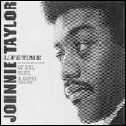 • Johnnie Taylor: Lifetime, Fantasy, 2000.
• Johnnie Taylor: Lifetime, Fantasy, 2000.
JOHNNIE TAYLOR possessed an impressive gospel pedigree. Working with The Highway QCs and The Soul Stirrers — in each case following Sam Cooke — Taylor, like Cooke, left gospel to pursue a career in popular music. This triple disc anthology spans 1956 to 1999, covering every phase of his career.
Born in Crawfordsville, Arkansas, Taylor began singing in church at six years old. By age 10 he had moved to Kansas City and was performing with local gospel quartets. Leaving home at 15, he headed to Chicago, recording doo-wop with The Five Echoes in 1953 and ’54 before replacing Lou Rawls — who had replaced Cooke — in The Highway QCs. Taylor sang on ‘Somewhere to Lay My Head’ — a national hit for the group in 1955. He replaced Cooke in The Soul Stirrers in early 1958, and began developing an intense, soulful delivery that spoke volumes without resorting to shouting.
During his tenure with the group, Taylor was ordained a Fellowship Baptist minister. According to Wolf Stephenson, Taylor’s producer from 1984 to 1999: “His knowledge of scripture was encyclopedic. If you didn’t think he could preach, you let him get started and he could go — he had the spirit.”
Unfortunately, he also had drink and drug problems. In 1960, smoking marijuana while driving, he hit a little girl. He avoided a jail sentence, but was immediately dismissed from the group.
Relocating to Los Angeles, he began preaching full time. A year later, he signed a solo deal with Sam Cooke’s SAR record label. Cooke produced and wrote much of Taylor’s material, including ‘Rome Wasn’t Built in a Day,’ on which he shared backup vocals with Lou Rawls.
Moving to Stax Records in 1966, Taylor scored his first major pop hit with ‘Who’s Making Love’ in 1968. With a total of 24 songs placing on the charts during his tenure with Stax, this was Taylor’s golden age.
After a decade with Stax, he signed with industry giant Columbia Records. His debut for the label, ‘Disco Lady,’ held the top pop position for four weeks, becoming the first-ever single to be certified platinum — for sales of a million copies — by the RIAA.
Taylor wrote ‘God is Standing By’ for the Soul Stirrers, but left before they recorded the song. He finally put his own version on vinyl in 1977; his only recorded return to gospel, it’s one of this collection’s numerous highlights.
From 1984 until 1999, Taylor recorded for Malaco, a southern label specializing in gospel, blues and soul music. The box ends with four tracks from his time at the label, including the final selection, ‘Soul Heaven.’ Inspired by a Taylor composition for the Highway QCs, ‘I Dreamed Heaven was Like This,’ (which opens this set), he sings of departed greats performing in an all-star concert. Recorded only months before his passing, it’s a fitting close to a remarkable career, easily making the case that he deserves a place on that esteemed list.
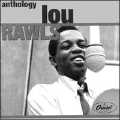 • Lou Rawls: Anthology, The Right Stuff, 2000.
• Lou Rawls: Anthology, The Right Stuff, 2000.
In 1942, at the age of seven, Lou Rawls began his singing career with the Greater Mount Olive Baptist Church in Chicago. By his teens, he was leading his own gospel group — The Little Kings of Harmony. Upon graduating from high school, he moved on to the national circuit with The Pilgrim Travelers, a popular gospel quintet.
The group frequently shared stages with the Soul Stirrers, who at the time featured Sam Cooke. While travelling together after a show, the two singers were involved in an accident that left their driver dead, and Rawls in a coma for five days. The event had a curious effect: Rawls was motivated to leave gospel music behind — and soon after, he embarked on a mainstream solo career.
Relocating to California in the early sixties, after a handful of singles on the Candix label he signed with Capitol Records, perfecting a pop/jazz/blues/soul hybrid that brought a number of charting records.
This double disc collection sticks with the Capitol years, spanning 1962 – 1970. It features all the hits, including: ‘Love is a Hurtin’ Thing’ and ‘Your Good Thing is About to End,’ as well as a generous selection of album highlights.
While there is no gospel in this package, Rawls did revisit his roots on Capitol; his first LP for the label was a reunion with the Pilgrim Travelers in 1962.
By the end of the decade the hits had subsided; but he came back strong in 1976 with the Philly soul classic ‘You’ll Never Find Another Love Like Mine,’ and found new life in the disco era. Today, Rawls records jazz-oriented material for Blue Note.
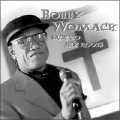 • Bobby Womack: Greatest Hits, The Right Stuff, 1999.
• Bobby Womack: Greatest Hits, The Right Stuff, 1999.
• Bobby Womack: The Poet II, The Right Stuff, 1984/2000.
• Bobby Womack: Back to My Roots, The Right Stuff, 1999.
As a youngster, Bobby Womack travelled the gospel circuit with his brothers, putting in almost a decade on the road before signing with Sam Cooke to his SAR record label. Concurrently releasing gospel with the Womack Brothers and pop material with the Valentinos, Womack prospered. His raspy tenor was a natural in the studio.
His writing blossomed, as well. In 1964, ‘It’s All Over Now’ — the final charting single for the Valentinos — was covered by the Rolling Stones, hitting number one in England and helping to break the act in America. The song has gone on to become a R&B standard, with versions recorded by Ry Cooder, the Chambers Brothers, John Anderson, J. Geils Band, Rod Stewart and a host of others.
Womack songs have been covered by everyone from Janis Joplin (‘Trust Me’) to George Benson (‘Breezin’), and James Taylor (‘Woman’s Gotta Have It’) to Wilson Pickett (who recorded 17 Womack compositions — including ‘I’m a Midnight Mover’ and ‘I’m in Love’). As a session player, he’s worked with an equally impressive list of performers, including Ray Charles, Aretha Franklin, Gabor Szabo, Dusty Springfield and Todd Rundgren.
In addition to singing with his brothers, Womack toured and recorded as Cooke’s guitarist from 1960 until the singer was murdered in 1964. In a controversial move, three months later he wed the soul legend’s widow. By 1970 the marriage was history and Womack, deep into party mode, was working on There’s A Riot Goin’ On with Sly & the Family Stone. The hedonistic lifestyle would soon bring Sly Stone’s career to an early end, but Womack continued on, living a life of legendary excess.
For a few years he seemed to be surrounded by death. He visited Janis Joplin in her hotel room only hours before she was found dead of a heroin overdose. His brother Harry was murdered, stabbed to death by his girlfriend while visiting Womack’s home in 1978. He lost two of his sons — one at four months old, and the other to suicide while in his teens. Womack’s drug buddy, recording artist Larry Williams, died in 1980 under suspicious circumstances.
By 1981, Womack had straightened out and released what is arguably his finest effort: The Poet. With five weeks at the top of the R&B album charts, it was also his most popular. Owing to legal hassles with his label, a belated follow-up, The Poet II, wasn’t released until three years later. That album included a reunion with his surviving brothers, and three duets with Patti Labelle, including the hit ‘Love Has Finally Come At Last.’ Both albums were well received, and helped to break Womack in England, where Blues & Soul magazine named him best vocalist, songwriter, and live performer.
Greatest Hits offers an hour-plus overview of the high points. Seventeen of the 19 tracks made the R & B charts. That’s an impressive figure, but Womack has placed 44 times — he could easily fill a double disc set, without any rot setting in. As if to prove there’s not much difference between pop and gospel, ‘Save the Children,’ included on Greatest Hits, includes a reading of the Lord’s Prayer.
There are well over a dozen greatest hits collections for Womack, due in part to the myriad of labels he’s recorded for. This collection does better than most, cross-licensing his most essential singles. Conspicuous in it’s absence ‘ nothing from The Poet or The Poet II’ but both albums are currently available on The Right Stuff.
Back to My Roots, a full-on return to gospel, opens with a spoken introduction from J.W. Alexander — Sam Cooke’s business partner, and a former vocalist with The Pilgrim Travelers. It’s a moving statement, all the more poignant because Alexander passed on soon after the recording was made.
The disc is dedicated to Womack’s late father, Friendly Sr. He tells of his father’s prayer to have five sons, and his pledge to teach them to praise God: “Well, he got his wish, not knowing that we would want the material things in life / I remember the first time I told my father I was going to sing rock and roll; that’s the first time I saw my daddy cry / I remember him saying, ‘What does it profit a man to gain the world, and lose his soul?’ / And I know now, absolutely nothing.”
A sordid past might lead one to assume this to be an instance of the repentant prodigal son returning to the fold; but that’s hardly the case, as he explained in a recent interview: “People think that no man should come to God late — I never left him! People thought I left when I started singing secular music, but I sing with spirit.”
Song selection is inspired, including three Sam Cooke tunes, Gene McDaniels’ ‘100 Pounds of Clay,’ gospel group classics by Archie Brownlee and Claude Jeter, and more. Womack remains in great voice, funky, tough, and greasy as ever. Programmed drums are at times intrusive, distracting from some powerful performances, but Womack himself delivers the goods.
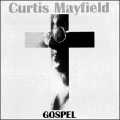 • Curtis Mayfield: Gospel, Rhino, 1999.
• Curtis Mayfield: Gospel, Rhino, 1999.
With songs like ‘Amen’ and ‘People Get Ready,’ Curtis Mayfield made the sacred and secular go hand-in-hand, scoring hit records with solid gospel material. Born in Chicago, he got his start singing gospel with The Northern Jubilee Singers. That early training informed his writing throughout his career.
Credited with bringing social commentary to soul music, in 1957 he joined The Impressions. He wrote the majority of their hits (‘Gypsy Woman,’ ‘I’m so Proud,’ ‘Keep on Pushin,’ ‘It’s All Right’), as well as a number of classics for other local acts — including former band mate Jerry Butler, Major Lance and Gene Chandler. After going solo in 1970, he had hits with two songs from his score for the film, Superfly.
This compilation brings together solo tracks, as well as five from his days with The Impressions. Compiled shortly before his passing, the disc’s booklet includes a short message from Mayfield: “My heart and soul came from my early days in the church. My grandmother was a preacher, and it was through her that many of my song ideas came about. I hope that all of you who listen to this album will get the feeling of my early days in the church.”
From pop material like ‘You Ought to Be in Heaven,’ to the funky ‘Jesus’ — with the lines “Maybe the words that I say is just another way to pray” — Mayfield’s gift of intermingling the sacred with everyday life is apparent.
He possessed a remarkable spirit. Paralyzed from the waist down after a lighting tower collapsed on him prior to an outdoor concert in 1990, he went on record one of the finest albums of his career, New World Order, in 1997. He died in December, 1999.
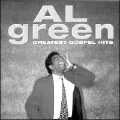 • Al Green: Greatest Gospel Hits, The Right Stuff, 2000.
• Al Green: Greatest Gospel Hits, The Right Stuff, 2000.
• Al Green: Take Me to the River, The Right Stuff, 2000.
• Al Green & Davin Seay: Take Me to the River, Harper Collins, 2000.
From Little Richard to Sam Cooke to Marvin Gaye, there’s a lengthy list of musicians who have toyed with the notion of returning to the church. Al Green, who started his career singing in a gospel quartet with his brothers — but was eventually fired (and banished from the family home) when his father discovered him listening to R & B legend Jackie Wilson — actually did it.
One of the all-time great soul singers, at the height of his career Green was ordained as a pastor in the Full Gospel Tabernacle — and he’s led his own church in Memphis for the past quarter century. While that might imply a radical change in lifestyle, musically it’s business as usual.
Far too often, when mainstream artists cross over to gospel, the result is a sanitized, overly reverent version of what made them popular. Thankfully, Green never ‘cleaned up’ his sound; the good news is delivered with energy and groove, in keeping with his classic recordings.
There was always a bit of church in his mainstream hits, and there’s more than a bit of soul in the gospel material. ‘God Blessed Our Love’ — including the lines “I like kissing you hugging you squeezing you / wanting you / holding you / loving you / I’m glad I’m still loving you” — may not be hymnal material; but it’s effective, nonetheless.
Greatest Gospel Hits compiles 18 tracks from 1974 to the title track from his mainstream reemergence, ‘Your Heart’s in Good Hands’ (1995). Every bit the equal of his pop hits, it’s a first-rate introduction to Green’s gospel recordings, rendering all others superfluous. A minor gripe — ‘Belle,’ one of his finest mixes of the secular and sacred, is missing.
That track is included, however, along with 29 others, on Take Me to the River, a double disc set of Green’s pop recordings. It includes 11 top 40 hits, from 1971 to ’81. Only two songs are duplicated between the two sets, and one (‘God Blessed Our Love’) is a live version on Take Me to the River — as opposed to Gospel Hits’ studio recording.
Green’s autobiography, also titled Take Me to the River, is a fascinating read. Discussing his life-long struggle between the sacred and the secular, Greene writes with candour of both his sexual exploits and spiritual yearning. Describing himself as “sinner and saint. Sex symbol and sanctified soul stirrer,” he goes into detail about his childhood, and gives ample credit to others, specifically those who prayed for him over the years.
© John Cody 2001
